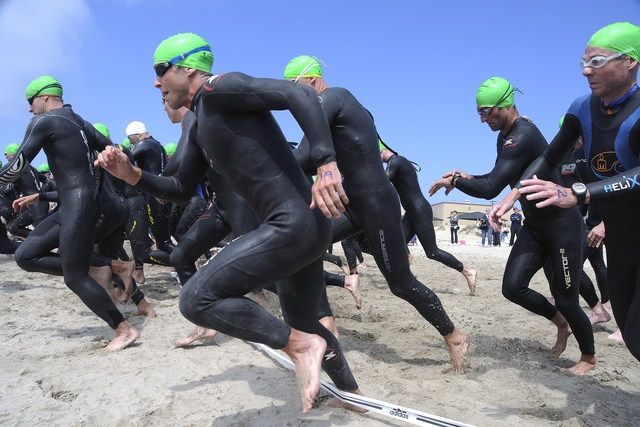Perhaps the most powerful mental tool to build your confidence is positive self-talk. What you say to yourself away from triathlon, when you’re training, and during races impacts what you think, how you feel, and how you perform in training and on race day. Whatever you think more of—whether positive or negative—will determine the road you go down.
Negative self-talk involves thinking or saying anything that reflects a lack of confidence, for example, “I’m going to do lousy today,” “I stink,” and “I can’t deal with these conditions.” If you say these things, you’re convincing yourself that you have little chance. With that attitude, you really have no chance because you are now your own worst enemy. Your motivation will disappear, you’ll get nervous, lose focus, and feel frustration, anger, and despair. You will definitely not be having fun out there.
If your talk is positive, your thoughts and feelings will be positive. Don’t say, “I don’t have a chance today.” Say, “I’m going to try my hardest today. I’m going to perform the best I can.” That will get you positive and fired up. By using positive self-talk, you’ll be your own best ally. You show yourself that, the course may try to beat you, but you aren’t going to beat you.
Positive self-talk helps you in many ways. It increases your motivation to work hard because you believe that your efforts will be rewarded. You’re relaxed and focused because you know you can handle anything that is thrown at you in training or competition. Your emotions reflect your positive self-talk with feelings of excitement and inspiration.
Most importantly, positive self-talk helps keep your mind strong and your body going, especially when your body starts to weaken. As your body wears down late in training and races, it will communicate to your mind that it has had enough—“I get the point! We can stop now.” If your mind listens to your body and responds with negative self-talk—“My body is so tired I can’t go on,” “This hurts too much to continue”—your body will take over your mind, your body and your mind will give up, and you will fail to achieve your goals. Positive self-talk can help your mind assert itself over your body, so when your body is yelling at you to stop, your mind can say, “NO! Keep going. That’s an order!” And your body will almost always keep going.
Retrain Your Self-talk
Positive self-talk is a simple, but not easy, strategy. It’s simple because all you have to do is replace your negative self-talk with positive statements. It’s not easy because your negative confidence muscles may be strong, and your positive confidence muscle may be weak. You begin retraining your self-talk by looking at the situations in which you tend to become negative, for example, when you’re doing a really painful track workout.
Next, figure out exactly why you become negative in these situations. Common reasons I have found include fatigue, boredom, pain, frustration, and despair. All triathletes have “hot button” issues that trigger negativity. Finding out what yours are is essential to changing your self-talk. Then, monitor what you say to yourself. I’ve found that triathletes tend to rely on favorite negative self-talk when their buttons get pushed, for example, “Gosh, I suck,” “You’re such a loser,” and “What’s the point of even trying.” Realizing what you say and how bad it is for you is an important first step in changing your self-talk. For most of the triathletes I’ve worked with, there is a consistent pattern of the situations in which negative self-talk arises, the causes of the negativity, and the specific self-talk they express.
Before you go out and face those hot-button situations again that typically lead to negativity, choose some positive self-talk with which you can replace your usual negative self-talk. The positive self-talk should be encouraging, but it must also be realistic. If you say things like, “I love being out here” when you really aren’t or “I ‘m feeling so strong” even when you don’t, there’s no way you’ll buy what you’re saying. Acknowledging the hot button, but putting a positive and realistic spin on it will make it more likely you’ll believe what you’re saying, such as “If I keep working hard, good things will happen” and “This really hurts, but its money in the bank for my race.” By putting this new tool in your toolbox before your buttons get pushed, you’ll have more ready access to it and have a better chance of responding more positively.
At this point, training yourself to use positive self-talk depends on your ongoing commitment to and focus on it. Because negative self-talk may be so ingrained, you’ll have to constantly remind yourself to be positive. Realizing when the hot-button situations are approaching will prepare you for your buttons to get pushed and help you focus on what you say when it happens. At first, you will probably “fall off the wagon” and slip back to your old, negative ways, but just accept it as part of the process and return to being positive when you realize it. With time and persistence, you’ll see a gradual shift away from negativity and toward positive self-talk until you realize that you just went through one of those hot-button situations and you stayed positive.
Balance the Scales
When I work with triathletes, I have them chart the number of positive and negative things they say during training and races. In many cases, the negatives far outnumber the positives. In an ideal world, I would love to eliminate all negatives and have them only express positives. But this is the real world and any triathlete who cares about their sport is going to the “dark side” on occasion.
In dealing with this reality, you should start by balancing the scales. If you’re going to be negative when you perform poorly, you should also be positive when you perform well. The immediate goal is to increase the positives. This means rewarding yourself when you have a great workout or show improvement in some area of triathlon. If you beat yourself up over a disappointing effort, why shouldn’t you pat yourself on the back when you have a great effort. Unfortunately, too many triathletes are perfectionists and, as a result, beat themselves up when they fail to live up to their extremely high expectations, but don’t congratulate themselves when they do. Tell yourself “nice effort” when you gave a nice effort. Give yourself a “job well done” when you have done the job well. You worked hard and you deserve a reward.
Once you’ve balanced the scales by increasing your positives, your next goal is to tip the scales in the positive direction by reducing the negatives. Ask why you’re so hard on yourself when you perform poorly (use the steps I discussed earlier in this article). Also, ask yourself if that negativity helps or hurts you (hint: It hurts you!). The world’s best triathletes don’t always perform their best. Why shouldn’t it be okay for you to have down periods in your performances?
This step of tipping the scales toward positives is so important because of some recent research that found that negative experiences such as negative self-talk, negative body language, and negative emotions carry more weight than positive experiences. In fact, it takes 12 positive experiences to equal one negative experience. What this means is that for every negative expression you make about yourself, whether saying something negative or screaming in frustration, you must express yourself positively 12 times to counteract that one negative expression.
Ultimately, you want to tip the scale heavily in the positive direction. Sure, you’re going to say some negative things periodically. That’s just part of being human and being a triathlete who cares about your sport. You get tired, sick, and injured. You get frustrated, angry, depressed. The conditions get the better of you. So, you get down on yourself occasionally. But, when you tip the scales in the positive direction, you will find that, in contrast to the past, you are far more positive, you have much more confidence, and, most importantly, you are your best ally rather than your worst enemy in training and on race day.
Use Negative Self-talk Positively
Even though I very much always emphasize being positive, the fact is, you can’t always be. You don’t always perform as well as you want and there is going to be some negative thinking. This awareness was brought home to me by a group of highly-ranked junior triathletes I worked with some time ago. During a training camp, I was constantly emphasizing being positive and not being negative (they gave me the nickname, the Wizard of Pos!). One night at dinner, several of them came up to me and said that sometimes things do just stink, and you can’t be positive. I realized that some negative thinking is normal when you don’t perform well, and some negative thinking can actually be healthy. It means you care about performing poorly and want to do better. Negative thinking can be motivating as well because it’s no fun to perform poorly and not achieve your goals. I got to thinking about how athletes could use negative thinking in a positive way. I came up with an important distinction that will determine whether negative thinking helps or hurts your triathlon efforts.
There are two types of negative thinking: give-up negative thinking and fire-up negative thinking. Give-up negative thinking involves feelings of loss, hopelessness, and helplessness, for example, “It’s over. I can’t win this.” You dwell on past disappointments such as a poor swim leg. It lowers your motivation and confidence, and it takes your focus away from performing your best. Your intensity also drops because basically you’re surrendering and accepting defeat. There is never a place in triathlon for give-up negative thinking.
In contrast, fire-up negative thinking involves feelings of anger, of being psyched up, for example, “I’m doing so badly. I hate performing this way” (said with anger and intensity). You look to doing better in the future because you hate performing poorly. Fire-up negative thinking increases your motivation to fight and turn things around. Your physical intensity goes up and you’re bursting with energy. Your focus is on being aggressive and attacking the course.
Fire-up negative thinking can be a positive way to turn your performance around. If you’re going to be negative, make sure you use fire-up negative thinking. But don’t use it too much. Negative thinking and negative emotions burn a lot of energy and that energy should be put in a more positive direction for your training and competitions.
Do you want to take the next step in training your mind to perform your best in training and on race day? Here are four options for you:
- Read my latest mental training book: Train Your Mind for Athletic Success: Mental Preparation to Achieve Your Triathlons Goals.
- Listen to my Train Your Mind for Athletic Success podcast.
- Take a look at my online mental training courses.
- Schedule a 1:1 session with me.







